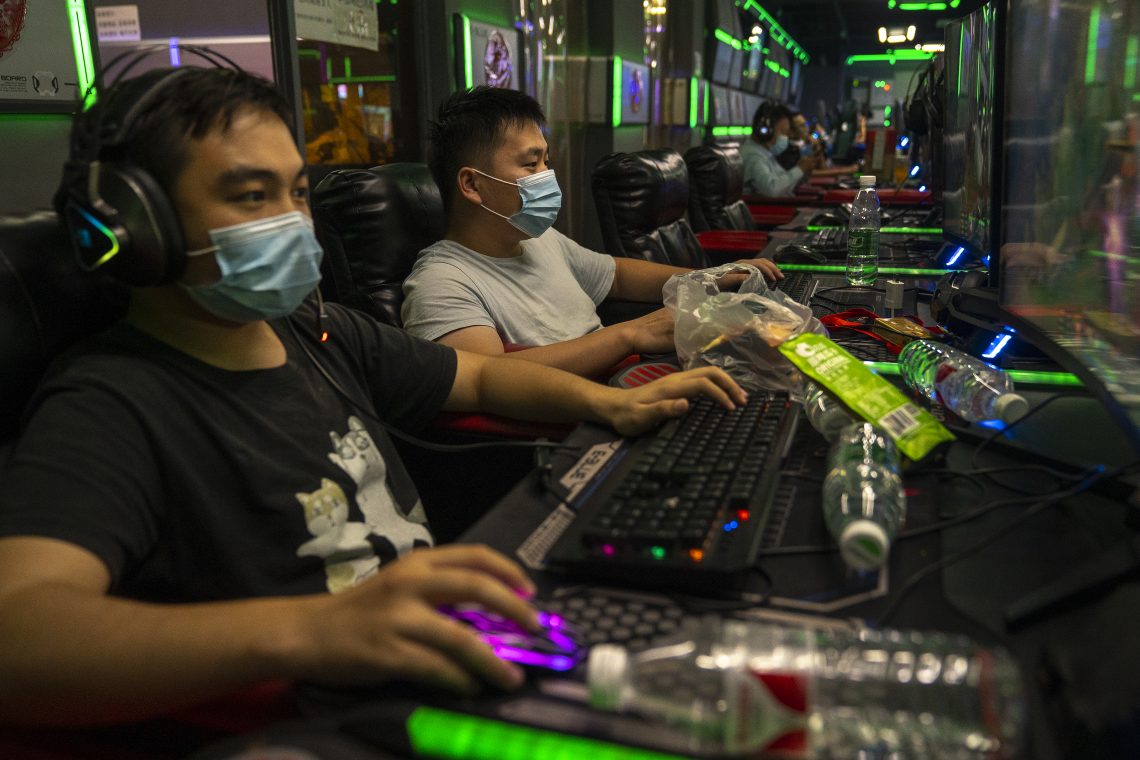ESSAYNOVEMBER 25, 2022
Where will technologization leave humanity?
Technology plays an ever-expanding role in modern society. We must ask where it serves our needs, and where it threatens the common good.

In a nutshell
- Society is digitizing at breakneck speed
- Feelings of loneliness and exclusion are rising
- Some tools are ripe for misuse by governments and bad actors
At the beginning of the 19th century, the name of an English weaver became synonymous with the destruction wrought by innovative machines, feared by textile workers as a threat to their way of life.
Ned Ludd was among the skilled workers who formed a radical faction popularly known as Luddites. The Luddite opposition to industrialization – the technologization of the day – began in Nottingham and from 1811 spread to other parts of the country. Over the course of five years, it provoked the shooting of protesters, legal suppression, penal transportation and executions.
Ludd’s name is still used as shorthand today to describe anyone opposed to industrialization, automation, computerization or the use of new technologies in general. They are all likely to be branded Luddites, as die-hard opponents of the great march of progress. In his day, poverty was endemic. Living conditions were appalling. England was in the throes of an industrial revolution and a war with Napoleon. The present was bad enough, but for the illiterate and disenfranchised poor, it was hardly irrational to fear a future that would have no use for their manual labor.
Lord Byron rose to the defense of the Luddites. Describing their sense of helplessness and destitution, he told the House of Lords in 1812 that he had been in “some of the most oppressed provinces of Turkey; but never, under the most despotic of infidel governments, did I behold such squalid wretchedness as I have seen since my return, in the very heart of a Christian country.”
The public held a deep suspicion of factory owners, the wealthy, and the out-of-touch political classes who were largely indifferent to the conditions Byron described to Parliament. Two centuries later, today’s political elites often seem similarly detached from the consequences of the technologization of society, which is taking place at a breathtaking pace.
The limits of the virtual
For many, there is the same sense of helplessness, of being left behind, and of being excluded that made change so frightening to Ned Ludd and his friends. Even if we stop short of taking a sledgehammer to our smartphones and social media accounts, it does not take a Luddite to see that the manifest benefits of digitizing our lives also come with risks and challenges.
One obvious benefit was experienced during the Covid pandemic, when apps like Zoom and WhatsApp enabled us to stay in touch with friends, families, and colleagues and for businesses to function. During the lockdowns, this prevented total economic paralysis. Even the British House of Lords – never at the forefront of innovation, and deeply suspicious of change for its own sake – adopted everything from electronic voting to online debates so that parliamentary business could continue.
And yet, and yet.
The loss of human contact, of being physically alongside colleagues, and the diminished interactions with colleagues and loved ones also reminded us of the limitations of technology. As a child, my mother took me to see the village from which she had emigrated in the far west of Ireland. I still treasure the touching letters posted by my mother each day to my father. Who will keep their text messages or emails? Technology makes things work, but it does not capture our humanity – and, paradoxically, contributes to a loss of human connectivity.
In turn, technologization furthers a growing sense of isolation and loneliness. Mind, a mental health charity in the United Kingdom, has reported a 14 percent increase in new diagnoses, with nine out of 10 young people saying that loneliness worsened their mental health during the pandemic. The group also found that young people are now more likely to use negative coping mechanisms like self-harm and spending too much time on social media.
In the United States, researchers at Harvard came to the same conclusion as Mind, pointing to a “loneliness epidemic” of rising social isolation, with older teens and young adults hardest hit. Some 36 percent of respondents to a U.S. survey reported feeling lonely “frequently” or “almost all the time or all the time” in the preceding four weeks. Feeling unwanted or depressed can never be addressed by artificial intelligence or any machine. Human security is based on an appreciation of one’s infinite worth: knowing that you are loved and of value.
Digital exclusion
Technologization can also reinforce fear, something Ned Ludd would have well understood. Many feel excluded and unable to cope with change because they have no access to technology or the skills to use it. In the UK, 11.7 million people (22 percent of the population) lack the digital skills needed for everyday life; 9 million are unable to use the internet and their devices on their own. Digital exclusion is linked to wider inequalities, more likely to be faced by those with low incomes, the disabled and the elderly.
Unaddressed, these dynamics simply add fuel to the fire. Political elites should not be surprised when voters in American Rust Belt states or British Red Wall constituencies – seeing themselves as part of an excluded “underclass” – lash out in favor of a populism that plays on the sense of fear and of being left behind. Even recognizing their limitations, the absence of digital skills and access prevents citizens from fully participating in our increasingly technological society.
A people-centered approach to politics would mean human contact over electronic messaging and concern for the grassroots.
In his book “The Tyranny of Merit,” the philosopher Michael Sandel argues that assuring people that they will succeed on their own merits is empty rhetoric, so long as the tools to do so are beyond their reach. He urges politicians to “listen attentively,” advocating more “mutual respect and inclusion in the public square.” He envisions a less resentful, rancorous discourse and a revival of civic virtues.
Working classes have been hung out to dry by the elites, according to Mr. Sandel. And, notwithstanding his loathing of Trumpism, he argues that “the populist backlash of recent years has been a revolt against the tyranny of merit, as it has been experienced by those who feel humiliated by meritocracy and by this entire political project.”
A people-centered approach to politics would see officials back at the coalface of the communities that elected them. It would mean human contact over electronic messaging and concern for what is happening at the grassroots. Gandhi was right to warn his supporters not to forget how to “dig the soil.”
To haughtily assure citizens that they are “essential workers” while failing to understand or address their core anxieties is a recipe for the further decline of liberal democracy, and its displacement by populism. But, at a global level, the use of technologization for malign purposes contains an even greater danger to democracy and our way of life.
Stranger than fiction
As the 1940s wound down, George Orwell looked at postwar Europe and wrote his forward-looking novel, “Nineteen Eighty-Four.” Its dystopian plot foresaw many things that are now commonplace. In the novel, they were experienced by Winston Smith – a frail, contemplative, intellectual 39-year-old, a minor functionary of the ruling Party.
Although he instinctively loathes the government’s totalitarian control, Smith is at first sustained by the belief that it will usher in a better world. He works diligently in the Ministry of Truth, rewriting history to serve the Party and canceling “unpersons” who have run afoul of it. But, by keeping a personal diary, Smith himself becomes guilty of “thought crime” and suffers the consequences. The totalitarian Big Brother regime, its Thought Police, the Room 101 torture chamber and all the tools of the technologized state grind down Smith’s humanity and capacity to act.
In liberal democracies, what may at first appear as well-meaning ‘progress’ can, in the wrong hands, deliver unprecedented power.
Thanks to this whole range of repressive tools, the individual is reduced to insignificance while the power of those in control is magnified. Some of these tools exist today, with technologies like the all-seeing CCTV (and not only by the Chinese Communist Party surveilling Uighurs in Xinjiang, or by Iranian mullahs in the streets of Tehran, or by Myanmar’s military junta); GPS, which can track us from place to place; and social media, which can whip up a storm of hate or a frenzy of fake news with a few clicks.
Highly advanced artificial intelligence also appears ripe for misuse by rogue states, terrorist groups and totalitarians. Pointing to the risks associated with developing AI, the late physicist Stephen Hawking issued an open letter urging that technologization must align with human values. In liberal democracies, what may at first appear as well-meaning “progress” can, in the wrong hands, deliver unprecedented power – or even the elixir of world government, to a seemingly benign World President.
As Russian novelist Aleksandr Solzhenitsyn put it, “There always is this same fallacious belief: ‘It would not be the same here; here such things are impossible.’ Alas, all the evil of the twentieth century is possible everywhere on earth.” Wherever someone (or some megacorporation) holds phenomenal technological capabilities, there must be a commensurate sense of political responsibility and the cultivation of civic virtue. A failure to do so can give extraordinary and dangerous power to those holding the keys.
Consider the gifted technologist Elon Musk, who himself has echoed Hawking’s warning about AI, and whose achievements at Tesla and SpaceX – electric cars to combat climate change and a would-be Martian outpost for mankind – are worthy ones. But with superhuman power and fabulous wealth comes a duty to overcome messianic impulses and the desire to control.

Mr. Musk has been compared to the Iron Man film character, who wants to construct a global protective shield of intelligent armor. Another of his heroes might be Clark Kent, who justifies his interventions with the totemic assertion, “I am Superman. I stand for truth, for justice, and for the future.”
The human condition suggests that such Hollywood altruism can be easily distorted. Take Mr. Musk’s decision to use SpaceX satellites to provide Ukraine with uninterrupted internet access – and his recent suggestions that he might withdraw that much-needed support. Should one man have the power to connect or disconnect societies at the flick of a switch, particularly when wartime survival is at stake? Deciding such existential questions must fall to the collective responsibility of political leaders, capable of being elected and rejected.
Similarly, Mr. Musk’s $44 billion Twitter takeover can certainly be portrayed, as he does, as an attempt to defend free speech. But that control can also be used to shape political debate in ways familiar to authoritarians. Resisting the lure of such power may be beyond him, or any of us.
There is much to admire about Elon Musk, and on many issues, he may be right. But in using every technological advantage to bend the future, he must understand that accumulating such awesome powers raises fundamental ethical questions, not least the absence of democratic accountability.
It is impossible to know what Ned Ludd and his followers would have made of all this. But for this author, this is not an appeal to simply smash technology. It is a call for a much deeper and wider debate about the limitations and potential risks of technologization. We must harness technology when it advances the common good and a more just society – and be prepared to call it out when it becomes our master, rather than our servant.


